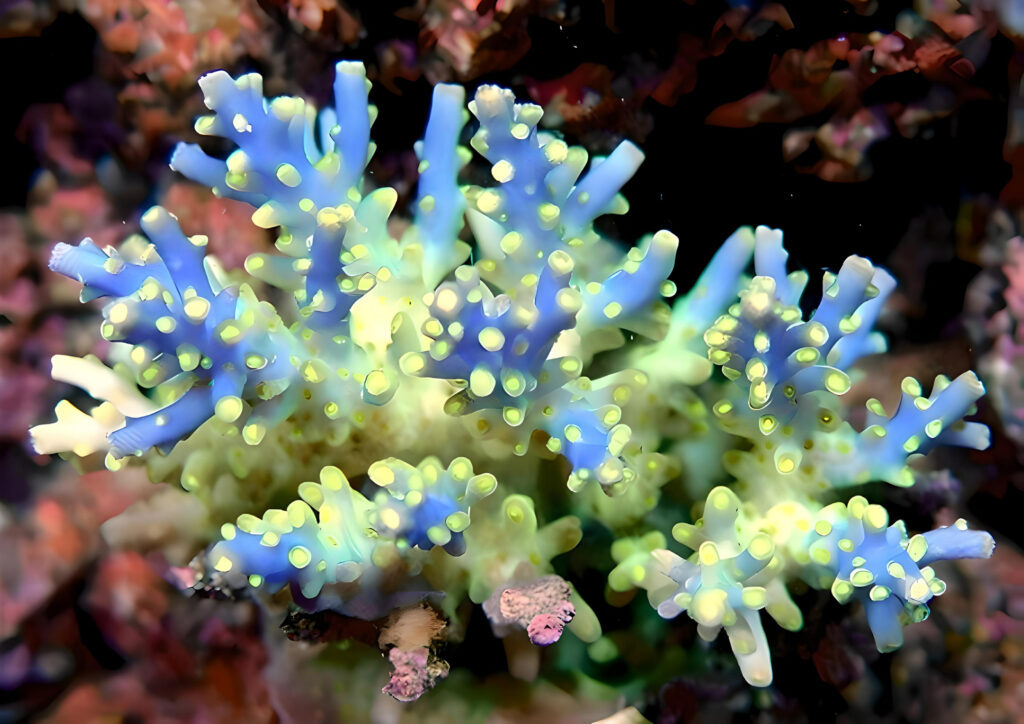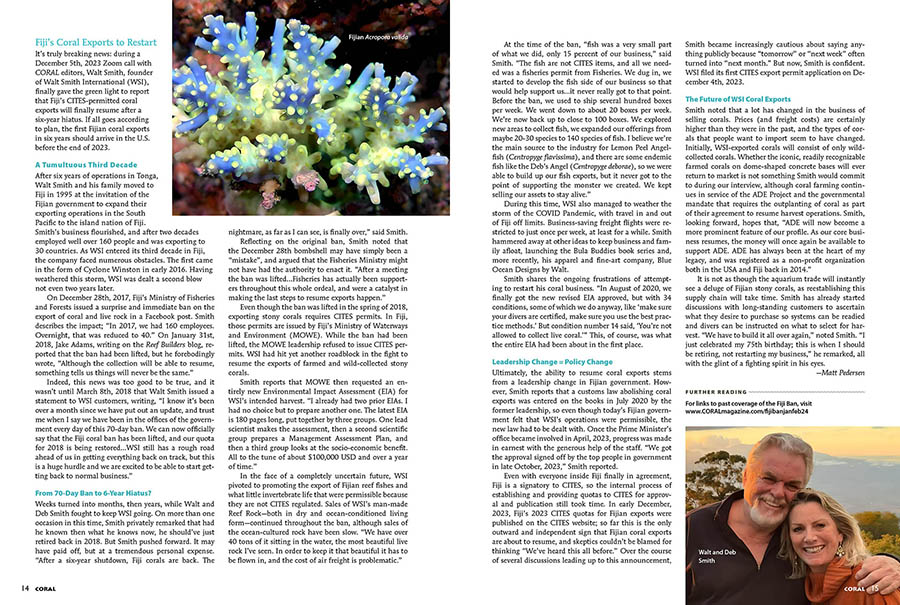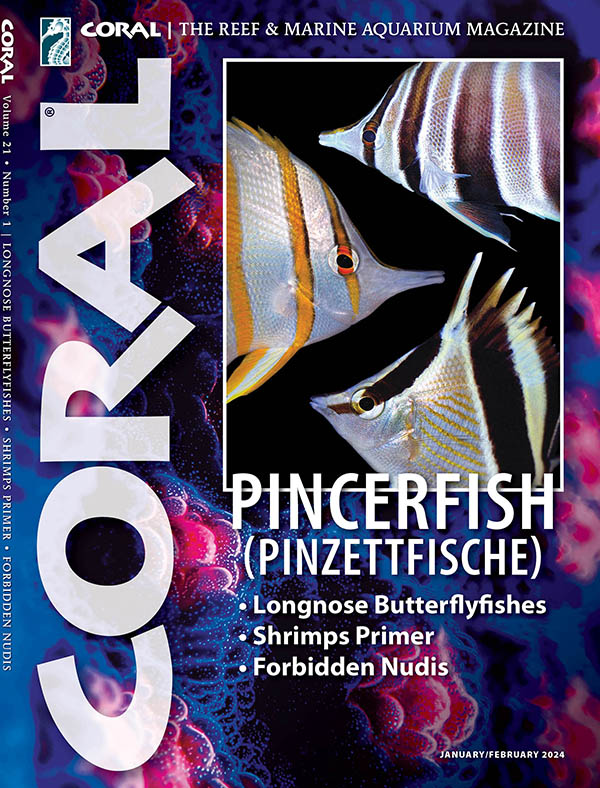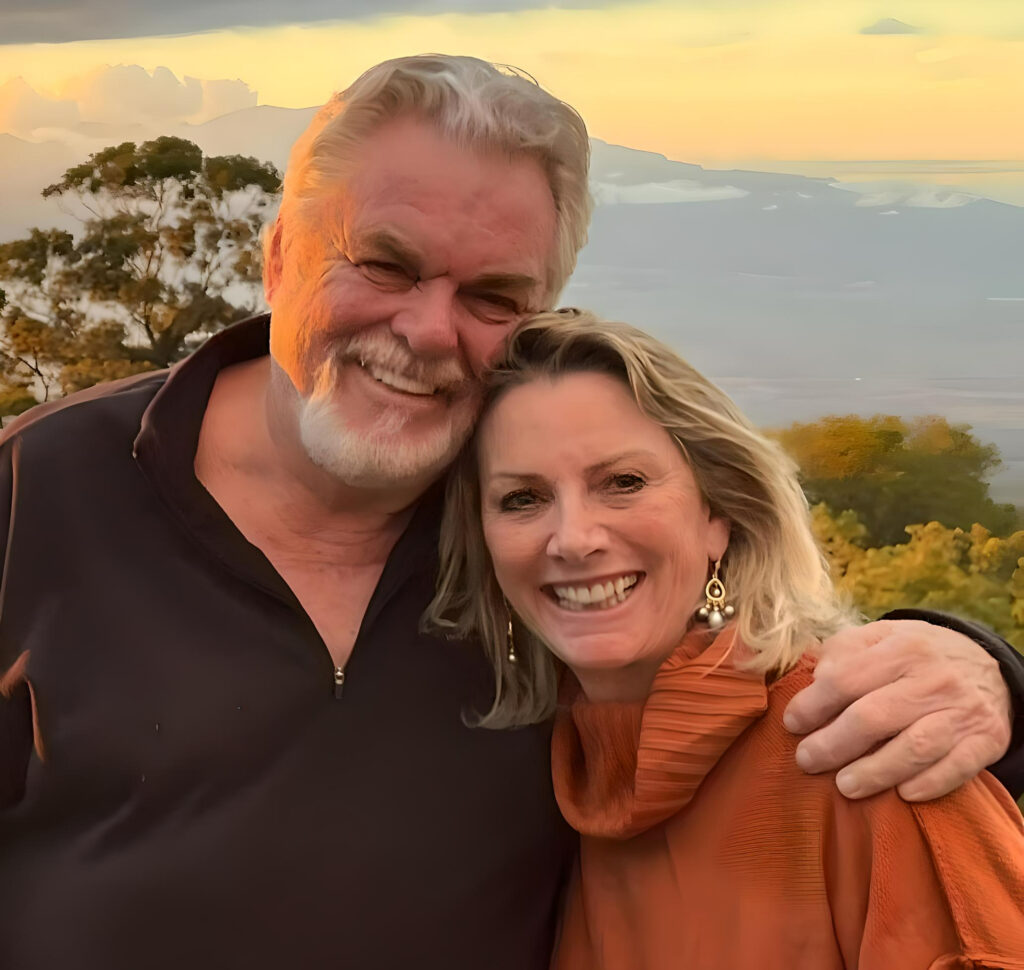
Update, 1/26/24: CORAL readers got the exclusive first announcement that Fiji’s trade in coral was finally set to resume after a 6-year hiatus in the January/February 2024 issue, PINCERFISH. Progress has continued since our article went to print in late December 2023, and in a conversation on January 26, 2024, Walt Smith shared the latest status update on Walt Smith International’s first coral exports in years.
“After the article went to print, we were waiting on permits, and we had to get CITES quotas straightened out to include ‘scleractinia pieces’ in Fiji’s CITES quotas. This additional line item covers any small piece of reef substrate that could be attached to a coral, and is necessary to meet the stringent requirements of the U.S. Fish and Wild Service (USFWS), and a few other countries that don’t consider that substrate covered by the CITES permits and quotas that govern the corals themselves.
“We got our first CITES export permits last week, but discovered some typos and information that wasn’t in the right place, so we had to get those permits corrected first. It’s hardly a surprise, as there haven’t been CITES coral exports issued in Fiji for years, and the people who are now responsible for issuing these permits have never done so before.
“In the meantime, we’ve been collecting corals for the past two weeks. Our raceways are full, and the corals are more colorful than I ever remember. The first two coral shipments are scheduled to depart on January 31st, and February 1st, 2024, headed for distributors in the U.S. Additional export permits have been obtained for aquarium trade importers in New Zealand, Singapore, Hong Kong, France, the United Kingdom, and applications are underway for other countries, e.g., the Netherlands.”
Smith reports that live rock exports are next on the agenda. Fiji has a quota in place but it wasn’t set in a manner that allows for the classic Fiji live rock that long-time aquarists might recognize. Discussions are ongoing with the various agencies responsible for managing and permitting this fishery. In the meantime, Smith strongly encourages customers to consider the WSI Reef Rock 2.0, which is the company’s ocean-cultured man-made rock. This rock is entirely exempt from CITES as it is not coral reef material nor is it derived from coral sources, yet it carries all the valuable biodiversity that aquarists recognize originating from ocean-sourced substrates.
To learn more about this story, read our exclusive excerpt from the January/February 2024 issue of CORAL, shared below:
Fiji’s Coral Exports to Restart

It’s truly breaking news: during a December 5th, 2023 Zoom call with CORAL editors, Walt Smith, founder of Walt Smith International (WSI), finally gave the green light to report that Fiji’s CITES-permitted coral exports will finally resume after a six-year hiatus. If all goes according to plan, the first Fijian coral exports in six years should arrive in the U.S. before the end of 2023.
A Tumultuous Third Decade

After six years of operations in Tonga, Walt Smith and his family moved to Fiji in 1995 at the invitation of the Fijian government to expand their exporting operations in the South Pacific to the island nation of Fiji. Smith’s business flourished, and after two decades employed well over 160 people and was exporting to 30 countries. As WSI entered its third decade in Fiji, the company faced numerous obstacles. The first came in the form of Cyclone Winston in early 2016. Having weathered this storm, WSI was dealt a second blow not even two years later.
On December 28th, 2017, Fiji’s Ministry of Fisheries and Forests issued a surprise and immediate ban on the export of coral and live rock in a Facebook post. Smith describes the impact; “In 2017, we had 160 employees. Overnight, that was reduced to 40.” On January 31st, 2018, Jake Adams, writing on the Reef Builders blog, reported that the ban had been lifted, but he forebodingly wrote, “Although the collection will be able to resume, something tells us things will never be the same.”
Indeed, this news was too good to be true, and it wasn’t until March 8th, 2018 that Walt Smith issued a statement to WSI customers, writing, “I know it’s been over a month since we have put out an update, and trust me when I say we have been in the offices of the government every day of this 70-day ban. We can now officially say that the Fiji coral ban has been lifted, and our quota for 2018 is being restored…WSI still has a rough road ahead of us in getting everything back on track, but this is a huge hurdle and we are excited to be able to start getting back to normal business.”
From 70-Day Ban to 6-Year Hiatus?
Weeks turned into months, then years, while Walt and Deb Smith fought to keep WSI going. On more than one occasion in this time, Smith privately remarked that had he known then what he knows now, he should’ve just retired back in 2018. But Smith pushed forward. It may have paid off, but at a tremendous personal expense. “After a six-year shutdown, Fiji corals are back. The nightmare, as far as I can see, is finally over,” said Smith.
Reflecting on the original ban, Smith noted that the December 28th bombshell may have simply been a “mistake”, and argued that the Fisheries Ministry might not have had the authority to enact it. “After a meeting the ban was lifted…Fisheries has actually been supporters throughout this whole ordeal, and were a catalyst in making the last steps to resume exports happen.”
Even though the ban was lifted in the spring of 2018, exporting stony corals requires CITES permits. In Fiji, those permits are issued by Fiji’s Ministry of Waterways and Environment (MOWE). While the ban had been lifted, the MOWE leadership refused to issue CITES permits. WSI had hit yet another roadblock in the fight to resume the exports of farmed and wild-collected stony corals.
Smith reports that MOWE then requested an entirely new Environmental Impact Assessment (EIA) for WSI’s intended harvest. “I already had two prior EIAs. I had no choice but to prepare another one. The latest EIA is 180 pages long, put together by three groups. One lead scientist makes the assessment, then a second scientific group prepares a Management Assessment Plan, and then a third group looks at the socio-economic benefit. All to the tune of about $100,000 USD and over a year of time.”
In the face of a completely uncertain future, WSI pivoted to promoting the export of Fijian reef fishes and what little invertebrate life that were permissible because they are not CITES regulated. Sales of WSI’s man-made Reef Rock—both in dry and ocean-conditioned living form—continued throughout the ban, although sales of the ocean-cultured rock have been slow. “We have over 40 tons of it sitting in the water, the most beautiful live rock I’ve seen. In order to keep it that beautiful it has to be flown in, and the cost of air freight is problematic.”
At the time of the ban, “fish was a very small part of what we did, only 15 percent of our business,” said Smith. “The fish are not CITES items, and all we needed was a fisheries permit from Fisheries. We dug in, we started to develop the fish side of our business so that would help support us…it never really got to that point. Before the ban, we used to ship several hundred boxes per week. We went down to about 20 boxes per week. We’re now back up to close to 100 boxes. We explored new areas to collect fish, we expanded our offerings from maybe 20-30 species to 140 species of fish. I believe we’re the main source to the industry for Lemon Peel Angelfish (Centropyge flavissima), and there are some endemic fish like the Deb’s Angel (Centropyge deborae), so we were able to build up our fish exports, but it never got to the point of supporting the monster we created. We kept selling our assets to stay alive.”
During this time, WSI also managed to weather the storm of the COVID Pandemic, with travel in and out of Fiji off limits. Business-saving freight flights were restricted to just once per week, at least for a while. Smith hammered away at other ideas to keep business and family afloat, launching the Bula Buddies book series and, more recently, his apparel and fine-art company, Blue Ocean Designs by Walt.
Smith shares the ongoing frustrations of attempting to restart his coral business. “In August of 2020, we finally got the new revised EIA approved, but with 34 conditions, some of which we do anyway, like ‘make sure your divers are certified, make sure you use the best practice methods.’ But condition number 14 said, ‘You’re not allowed to collect live coral.’” This, of course, was what the entire EIA had been about in the first place.
Leadership Change = Policy Change
Ultimately, the ability to resume coral exports stems from a leadership change in Fijian government. However, Smith reports that a customs law abolishing coral exports was entered on the books in July 2020 by the former leadership, so even though today’s Fijian government felt that WSI’s operations were permissible, the new law had to be dealt with. Once the Prime Minister’s office became involved in April, 2023, progress was made in earnest with the generous help of the staff. “We got the approval signed off by the top people in government in late October, 2023,” Smith reported.
Even with everyone inside Fiji finally in agreement, Fiji is a signatory to CITES, so the internal process of establishing and providing quotas to CITES for approval and publication still took time. In early December, 2023, Fiji’s 2023 CITES quotas for Fijian exports were published on the CITES website; so far this is the only outward and independent sign that Fijian coral exports are about to resume, and skeptics couldn’t be blamed for thinking “We’ve heard this all before.” Over the course of several discussions leading up to this announcement, Smith became increasingly cautious about saying anything publicly because “tomorrow” or “next week” often turned into “next month.” But now, Smith is confident. WSI filed its first CITES export permit application on December 4th, 2023.

The Future of WSI Coral Exports
Smith noted that a lot has changed in the business of selling corals. Prices (and freight costs) are certainly higher than they were in the past, and the types of corals that people want to import seem to have changed. Initially, WSI-exported corals will consist of only wild-collected corals. Whether the iconic, readily recognizable farmed corals on dome-shaped concrete bases will ever return to market is not something Smith would commit to during our interview, although coral farming continues in service of the ADE Project and the governmental mandate that requires the outplanting of coral as part of their agreement to resume harvest operations. Smith, looking forward, hopes that, “ADE will now become a more prominent feature of our profile. As our core business resumes, the money will once again be available to support ADE. ADE has always been at the heart of my legacy, and was registered as a non-profit organization both in the USA and Fiji back in 2014.”
It is not as though the aquarium trade will instantly see a deluge of Fijian stony corals, as reestablishing this supply chain will take time. Smith has already started discussions with long-standing customers to ascertain what they desire to purchase so systems can be readied and divers can be instructed on what to select for harvest. “We have to build it all over again,” noted Smith. “I just celebrated my 75th birthday; this is when I should be retiring, not restarting my business,” he remarked, all with the glint of a fighting spirit in his eyes.
—Matt Pedersen
Further Reading
For links to past coverage of the Fiji Ban, visit
www.CORALmagazine.com/fijibanjanfeb24





This is great news! Thank you for sharing. WSI has really worked hard to keep the hobby so many love alive for the home hobbyist.